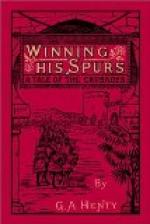“And what can I do for you, Cuthbert?” Sir Walter said, as they rode homewards. “It is to you that I am indebted: in the first place for the rescue of my daughter, in the second for the capture of that castle, which I doubt me much whether we should ever have taken in fair fight had it not been for your aid.”
“Thanks, Sir Walter,” the lad replied. “At present I need nothing, but should the time come when you may go to the wars, I would fain ride with you as your page, in the hope of some day winning my spurs also in the field.”
“So shall it be,” the earl said, “and right willingly. But who have we here?”
As he spoke a horseman rode up and presented a paper to the earl.
“This is a notice,” the earl said, after perusing it, “that King Richard has determined to take up the cross, and that he calls upon his nobles and barons to join him in the effort to free the holy sepulchre from the infidels. I doubt whether the minds of the people are quite prepared, but I hear that there has been much preaching by friars and monks in some parts, and that many are eager to join in the war.”
“Think you that you will go to the war, Sir Walter?” Cuthbert asked.
“I know not as yet; it must much depend upon the king’s mood. For myself, I care not so greatly as some do about this question of the Holy Land. There has been blood enough shed already to drown it, and we are no nearer than when the first swarms of pilgrims made their way thither.”
On Cuthbert’s returning home and telling his mother all that had passed, she shook her head, but said that she could not oppose his wishes to go with the earl when the time should come, and that it was only right he should follow in the footsteps of the good knight his father.
“I have heard much of these Crusades,” he said; “canst tell me about them?”
“In truth I know not much, my son; but Father Francis, I doubt not, can tell you all the particulars anent the affair.”
The next time that Father Francis, who was the special adviser of Dame Editha, rode over from the convent on his ambling nag, Cuthbert eagerly asked him if he would tell him what he knew of the Crusades.
“Hitherto, my son,” he said, “the Crusades have, it must be owned, brought many woes upon Europe. From the early times great swarms of pilgrims were accustomed to go from all parts of Europe to the holy shrines.
“When the followers of the evil prophet took possession of the land, they laid grievous burdens upon the pilgrims, heavily they fined them, persecuted them in every way, and treated them as if indeed they were but the scum of the earth under their feet.
“So terrible were the tales that reached Europe that men came to think that it would be a good deed truly, to wrest the sepulchre of the Lord from the hands of these heathens. Pope Urban was the first to give authority and strength to the movement, and at a vast meeting at Claremont of 30,000 clergy and 4000 barons, it was decided that war must be made against the infidel. From all parts of France men flocked to hear Pope Urban preach there; and when he had finished his oration, the vast multitude, carried away by enthusiasm, swore to win the holy sepulchre or to die.




